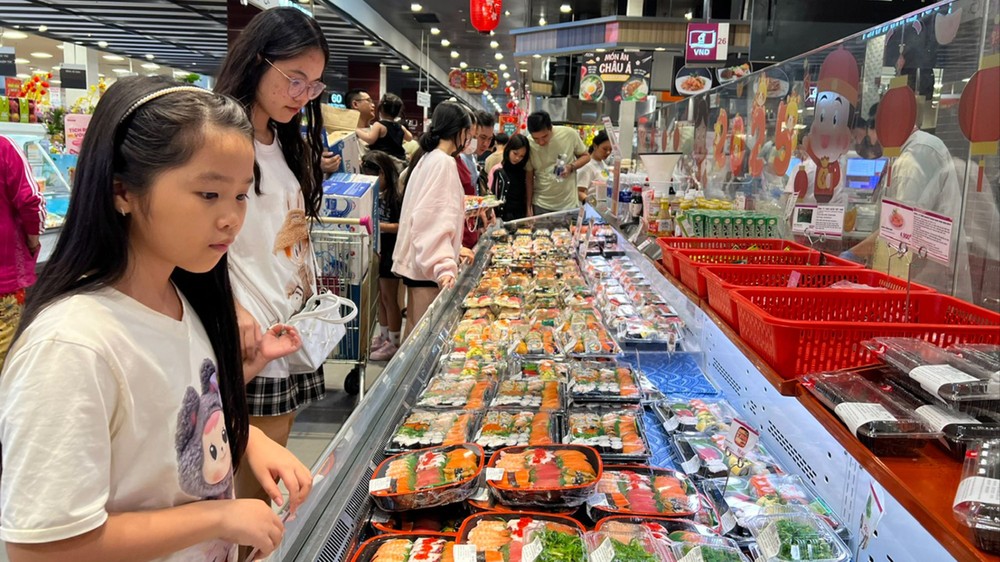
Domestic market is flooded with cheap foreign goods
The market has recently been inundated with imported goods at unexpectedly low prices. As an illustration, cherries - once viewed as a luxury item - are now available at a wholesale rate of approximately VND80,000 per kilogram.
Sellers on Facebook and TikTok claim these products are imported directly from Chile and transported by sea, allowing for competitive pricing.
A woman in Luy Ban Bich Street in Ho Chi Minh City’s Tan Phu District named Mai Loan revealed that a few days ago, she bought cherries because of its affordable prices, but when she ate it, she found the quality was poor, the fruit was bland, hard, and a bit sour.
Across the southern largest city, peony grapes are also sold in piles on carts and stores with a kilogram costing about VND100,000 (US$3,93) while this fruit imported from Korea costs about VND600,000 per kg and Japanese-grown fruit costs from VND1 million per kg.
The import of frozen meat products from India, the U.S., and Brazil has surged significantly. In Ho Chi Minh City, imported frozen pork is priced 30 percent –40 percent lower than domestic alternatives.
According to Director Dinh Quang Khoi of Marketing at MM Mega Market Vietnam, the influx of low-priced products from markets like China and the U.S. is expected to become increasingly common across various industries due to the impact of the trade war. This trend is anticipated to continue flooding Vietnamese supermarkets and stores, putting domestic agricultural products under significant pressure.
In addition, in the coming time, the prices of consumer goods will be likely to be adjusted. Representatives of some other retail systems in Ho Chi Minh City also informed that the market stabilization program will last until the end of January, but currently some businesses and suppliers have proposed to lift the selling price.
HCMC provides loans for expanding the market
To bolster the resilience of the retail sector, major supermarket chains—including Saigon Co.op, MM Mega Market, Central Retail Group, and Satra—are collaborating with the Ho Chi Minh City Department of Industry and Trade. Their efforts focus on extending price stabilization programs, introducing various promotions and incentives, and negotiating with suppliers to secure the best prices for consumers.
Communications Director Nguyen Thi Bich Van of Central Retail Vietnam Group owning GO!, BigC, said that the group has been promoting connections and searching for suppliers of regional specialties such as dried buffalo meat, dried bamboo shoots, dried beef, dried deer from localities across the country.
The goal is to bolster the value chain of Vietnamese agricultural products, enabling more Vietnamese goods to enter the Central Retail supermarket system and contribute to building sustainable livelihoods within local communities.
In the past, the group has also connected growers in some mountainous provinces and cities while and instructing them on clean and safe agricultural cultivation methods to gradually bring products into the supermarket system. Enterprises supplying goods for the domestic market and exporting consumer goods have also calculated many strategies suitable for the times.
A representative of Safoco Food Joint Stock Company said that the company is home to a nationwide distribution network spanning over 8,000 retail outlets.
Meanwhile, the company has adopted a marketing strategy that it constantly looks to expand the market to avoid risks. Therefore, the company's products are exported to many countries around the world, especially markets that require high quality such as the US, Australia, UK, France, Germany, Canada, Russia, Norway, Sweden, Czechoslovakia, Korea, Japan.
In order to support businesses, recently at a meeting of the industry and trade sector, Director of the Department of Industry and Trade of Ho Chi Minh City Bui Ta Hoang Vu informed that business establishments wishing to borrow for production and business will be eligible for preferential loans in a loan package of nearly VND200,000 billion.
Even businesses established in other provinces and cities but headquartered in Ho Chi Minh City can gain acceptance for the loans.
Over time, policies aimed at supporting interest rates, reforming tax structures, simplifying administrative processes, and facilitating business access to capital will progressively enhance purchasing power. This will enable Vietnamese products to strengthen their market presence domestically while also expanding into international markets, thereby better positioning themselves in the context of the ongoing trade war.
Ministries continue to explore large markets
During the recent government meeting, various ministries and departments expressed a consensus regarding the increasing likelihood of a trade war, emphasizing the necessity for solutions to address this potential issue.
The Ministry of Agriculture and Rural Development collaborated with the Ministry of Foreign Affairs to enhance the Halal (Islamic) market. Additionally, it worked alongside the Ministry of Industry and Trade to further promote this market in key regions, including the United States, China, as well as in European markets, Japan, South Korea, and the Philippines.
Ministry leaders affirm that preparing planting and farming areas, meeting food safety standards, and tracing raw material origins will ensure product quality and consolidate the market.
























